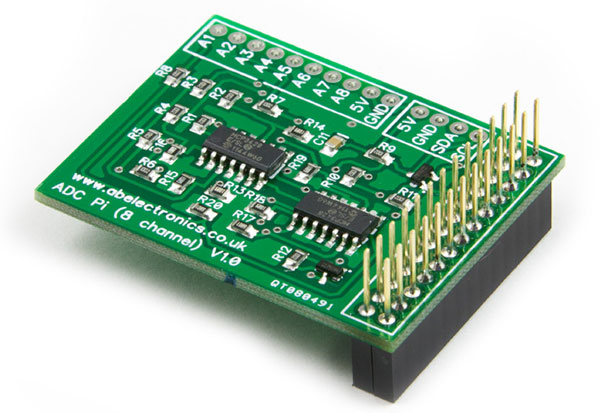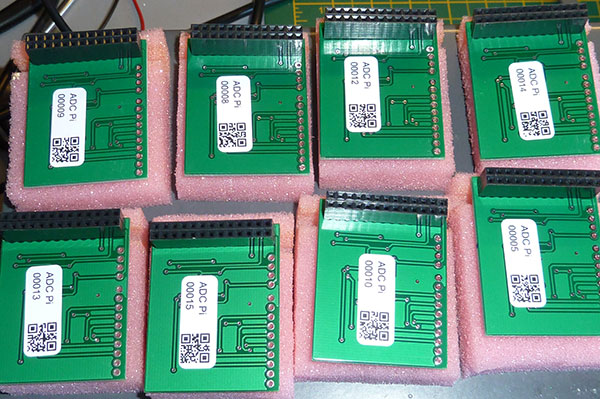Update April 2015
Since the launch of this first ADC board for the Raspberry Pi, it has been replaced with the ADC Pi models and we have also made variants of the ADC board with an ADC Differential Pi which is an 8 channel 18 bit analogue to digital converter designed to work with the Raspberry Pi and also an ADC-DAC Pi Zero is a 2 channel 12 bit analogue to digital converter and 2 channel 12 bit digital to analogue converter designed to work with the Raspberry Pi.
Original Post:
 After a huge response to the post for the Raspberry Pi I2C Analog to Digital Converter and being featured on the Hackaday website, we decided to go ahead and build Raspberry Pi I2C Analog-to-Digital Converter boards to sell online.
After a huge response to the post for the Raspberry Pi I2C Analog to Digital Converter and being featured on the Hackaday website, we decided to go ahead and build Raspberry Pi I2C Analog-to-Digital Converter boards to sell online.
The new board is an 8 channel Analogue to Digital Converter, Buffered 5V i2c interface, and stackable design using the same style of stackable headers as used on Arduino boards we also stock the connectors for the Raspberry Pi and Arduino boards.
The ADC Pi is an 8 channel 15 bit analogue to digital converter designed to work with the Raspberry Pi platform. The ADC Pi is based on two Microchip MCP3428 A/D converters each containing 4 analogue inputs with up to 16-bit resolution.
The MCP3428 is a delta-sigma A/D converter with low noise differential inputs. We designed the ADC Pi to work as a single-ended A/D converter using the internal 2.048V reference voltage with the -V pins tied to ground.
A voltage divider on the ADC Pi board brings the input voltage range to a much more useful 0 – 5.06V. With this configuration, the sample size is 15 bits for each channel.
The ADC Pi is powered through the host Raspberry Pi using the GPIO port and extended pins on the GPIO connector allow you to stack the ADC Pi along with other development boards.
The two MCP3428 A/D converters communicate via i2c to the host Raspberry Pi giving you eight analogue inputs to use. A logic level converter is included on the ADC Pi board giving you a buffered 5V i2c port making it easy to add other I2C devices which operate at 5 volts without damaging the raspberry pi 3.3 volt i2c port. The i2c buffer uses BSN20 NPN MOSFETs with a maximum drain current of 100mA.
The new ADC Pi board and other associated connectors and accessories are available to order on our new e-commerce shop at www.abelectronics.co.uk
Our first batch of the new Raspberry Pi I2C Analog-to-Digital Converter boards are ready to ship.
We would love to hear how you are using the ADC Pi boards in your projects and can feature your projects on the AB Electronics blog if you can send us photos and a description.


Kevin
So, can I use the 5V terminal to send voltage out to a 5V pressure transducer and then back on an analog terminal (1.5-4.5V) to be converted to pressure? Will this damage the Raspberry putting a possible 5Volts back? Is this what the 5V terminals can be used for?
Brian
Kevin, Yes you can use the ADC Pi inputs to read from your sensor to a maximum of 5V without damaging the Raspberry Pi.